甘肃省白银市会宁县枝阳初级中学七年级英语下册《Lesson 8 Marco Polo and the
新人教版七年级英语下unit8课件PPT
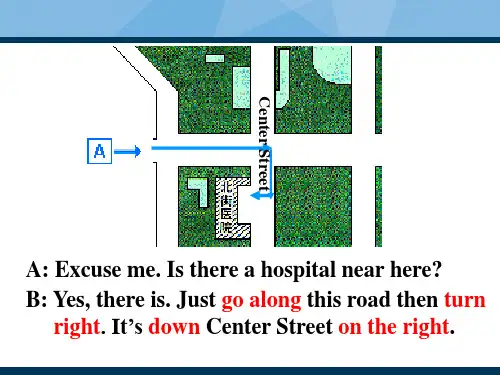
Grammar Focus
Is there a bank near here?
Are there any restaurants near here? Where’s the hotel?
Where’s the bank? Where’s the park?
Where are the pay phones?
here? Linda: Yes, there is. It’s on Center Street. It’s across
from the park. Tony: Oh … where’s Center Street? Linda: It’s not too far from here. I can walk with you. Tony: Oh, that’s great! Thanks so much. Linda: No problem.
G
F
CITY STREET
A PARK STREET
B
E
D C
1. You are at A. Go along Park Street. It’s on the right. Now you are at _______. B
2. You are at A. Go along Park Street and turn right. It’s down the City Street on the right. Now you are at __C___.
Center Street
A: Excuse me. Is there a hospital near here? B: Yes, there is. Just go along this road then turn
最新冀教版七年级英语下册Lesson8MarcoPoloandtheSilkRoad优质课件(1)
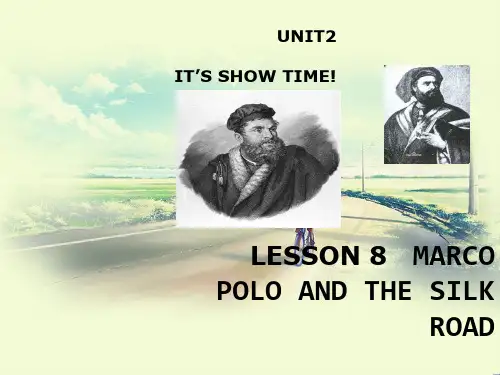
3 Learn to use Regular and Irregular Verbs
Click to add title in here
Important points
1 The important vocabulary. 2 Describe things in the past. 3 Know about Marco Polo.
daughter. • (4) __C__oa_l___(煤) is very important in our life. • (5) Did you __d_is_c_o_v_er_(发现) the truth?
Fill in the blanks
hope coal journey discover goods
Showing and exchange
1. at the age of… / when sb. was… years old 在……岁时 Eg: He moved to London at the age of 20 ( when he was
20 years old ).
2. discover 发现;了解 invent 发明;创造
Homework
• 1. Find the sentences with the simple past tense in this text.
• 2. Finish the exercises of lesson 8 in the text book.
• 3. Recite the new words and expressions.
Thank You!
Eg: He discovered a new star. Who invented the telephone?
甘肃省白银市会宁县太平中学七年级英语下册 Unit 2 Lesson 8 Marco Polo an
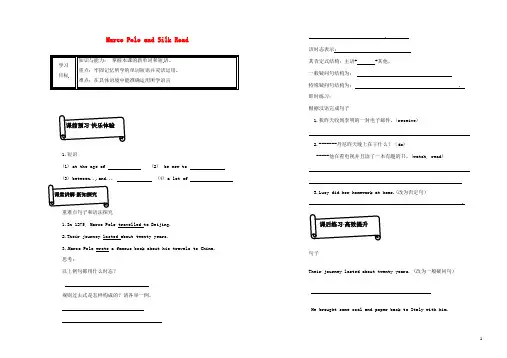
Marco Polo and Silk Road1.短语(1) at the age of (2) be new to (3) between...and... (4) a lot of重难点句子和语法探究1.In 1275, Marco Polo travelled to Beijing.2.Their journey lasted about twenty years.3.Marco Polo wrote a famous book about his travels to China.思考:以上例句都用什么时态?规则过去式是怎样构成的?请各举一例。
该时态表示:其否定式结构:主语+ +其他。
一般疑问句结构为:特殊疑问句结构为:即时练习:根据汉语完成句子1.我昨天收到李明的一封电子邮件。
(receive)2.-------丹尼昨天晚上在干什么?(do)-----他在看电视并且读了一本有趣的书。
(watch, read)3.Lucy did her homework at home.(改为否定句)句子Their journey lasted about twenty years. (改为一般疑问句) He brought some coal and paper back to Italy with him.学习目标知识与能力:掌握本课的新单词和短语。
重点:牢固记忆所学的单词短语并灵活运用。
难点:在具体语境中能准确运用所学语言课前预习·快乐体验课堂讲解·新知探究课后练习·高效提升1These things were new to Marco Polo.I hope to write a book like that someday.回顾本节课内容,从课文理解、语言运用和语法方面进行二次领会和记忆。
课后学习指导:复习并牢记序数词和表示月份的词。
1.熟练背诵课文。
2.认真预习Lesson 9,完成课前预习案,并在课本上进行重难点疑惑点的标注。
七年级下册英语unit8
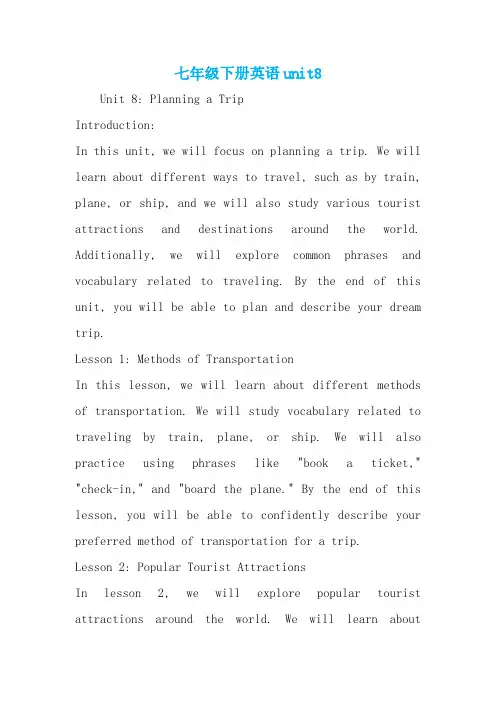
七年级下册英语unit8Unit 8: Planning a TripIntroduction:In this unit, we will focus on planning a trip. We will learn about different ways to travel, such as by train, plane, or ship, and we will also study various tourist attractions and destinations around the world. Additionally, we will explore common phrases and vocabulary related to traveling. By the end of this unit, you will be able to plan and describe your dream trip.Lesson 1: Methods of TransportationIn this lesson, we will learn about different methods of transportation. We will study vocabulary related to traveling by train, plane, or ship. We will also practice using phrases like "book a ticket," "check-in," and "board the plane." By the end of this lesson, you will be able to confidently describe your preferred method of transportation for a trip.Lesson 2: Popular Tourist AttractionsIn lesson 2, we will explore popular tourist attractions around the world. We will learn aboutfamous landmarks such as the Great Wall of China, the Eiffel Tower, and the Statue of Liberty. We will work on vocabulary related to describing these attractions, including words like "stunning," "breathtaking," and "historic." By the end of this lesson, you will be able to talk about your favorite tourist attractions and explain why they are worth visiting.Lesson 3: Planning the ItineraryIn this lesson, we will focus on planning the itinerary for a trip. We will discuss how to choose a destination, research activities, and create a schedule. We will learn useful vocabulary and phrases, such as "sightseeing," "accommodation," and "local cuisine." By the end of this lesson, you will be able to plan a detailed itinerary for your dream trip.Lesson 4: Booking AccommodationLesson 4 will cover the topic of booking accommodation. We will study different types of accommodation, including hotels, hostels, and vacation rentals. We will learn how to make reservations, ask for availability, and understand hotel amenities. By the end of this lesson, you will be able to confidentlybook accommodation for your trip and assess the quality of different options.Lesson 5: Packing for a TripIn this lesson, we will learn about packing for a trip. We will study vocabulary related to clothing, toiletries, and travel essentials. We will also discuss tips for efficient packing and staying organized. By the end of this lesson, you will be able to pack your suitcase with everything you need for your trip.Lesson 6: Describing Past TripsIn lesson 6, we will practice describing past trips. We will learn how to talk about our travel experiences, including the places we visited, the activities we did, and the people we met. We will practice using suitable tenses and vocabulary to share our adventures with others. By the end of this lesson, you will be able to confidently describe a memorable trip you've taken. Conclusion:By the end of this unit, you will have developed the necessary skills to plan and describe your dream trip. You will be able to discuss different methods of transportation, describe popular tourist attractions,plan a detailed itinerary, book accommodation, pack efficiently, and share your travel experiences. These skills will not only improve your English but also prepare you for future trips and adventures.。
七年级英语下册第八单元课件ppt
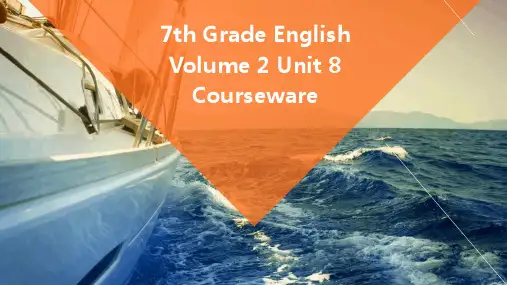
Oral practice questions
Design questions that require students to use specific vocabulary and grammar
structures they have learned
Provide examples of main ideas and explain how they are related to the overall topic or purpose of the listening material
Listening skills guidance
• Encourage students to take notes or use mental mapping techniques to record and organize main ideas
04 Oral training
Oral expression guidance
Teaching students to speak confidently and fluently in
English, focusing on promotion, introduction, and
stress
04
Discussions how these language features can be applied in similar listening situations
Listening skills guidance
Predicting Information
Guide students to use contextual clubs and family vocabulary to predict information about the listening material
七年级下册英语书第八单元
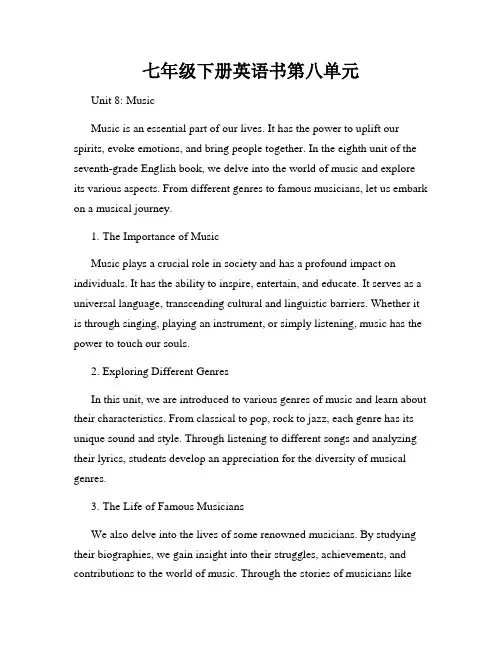
七年级下册英语书第八单元Unit 8: MusicMusic is an essential part of our lives. It has the power to uplift our spirits, evoke emotions, and bring people together. In the eighth unit of the seventh-grade English book, we delve into the world of music and explore its various aspects. From different genres to famous musicians, let us embark on a musical journey.1. The Importance of MusicMusic plays a crucial role in society and has a profound impact on individuals. It has the ability to inspire, entertain, and educate. It serves as a universal language, transcending cultural and linguistic barriers. Whether it is through singing, playing an instrument, or simply listening, music has the power to touch our souls.2. Exploring Different GenresIn this unit, we are introduced to various genres of music and learn about their characteristics. From classical to pop, rock to jazz, each genre has its unique sound and style. Through listening to different songs and analyzing their lyrics, students develop an appreciation for the diversity of musical genres.3. The Life of Famous MusiciansWe also delve into the lives of some renowned musicians. By studying their biographies, we gain insight into their struggles, achievements, and contributions to the world of music. Through the stories of musicians likeBeethoven, Mozart, Elvis Presley, and Madonna, we learn about their impact on the music industry and how they have shaped musical trends.4. Song AnalysisA significant part of this unit involves analyzing songs. Students are encouraged to listen to different songs and analyze their lyrics. This process not only improves listening skills but also enhances language comprehension. By examining the themes, metaphors, and imagery used in songs, students develop a deeper understanding of the messages conveyed by musicians.5. Music in Different CulturesMusic is deeply rooted in culture and traditions. In this unit, we explore the role of music in different cultures around the world. By studying traditional folk songs, dances, and musical instruments from various countries, students gain a broader perspective on the diverse forms of musical expression.6. Music and EmotionsOne of the remarkable features of music is its ability to evoke emotions. Different melodies, harmonies, and rhythms can influence our moods and feelings. This unit explores the relationship between music and emotions, allowing students to reflect on how specific songs make them feel and why.7. Creating MusicLastly, this unit encourages students to unleash their creativity by composing their own music. By composing simple melodies, experimenting with different instruments, or writing lyrics, students can experience the joyof musical creation firsthand. This activity fosters imagination, self-expression, and teamwork among students.ConclusionIn conclusion, the eighth unit of the seventh-grade English book provides an in-depth exploration of music and its significance in our lives. Through studying different genres, analyzing famous musicians, and experimenting with music creation, students gain a comprehensive understanding of the power and beauty of this universal language. Let us embrace the magic of music and continue to explore its diverse forms and endless possibilities.。
七年级下册英语八单元课文
七年级下册英语八单元课文Unit 8 Our HealthLesson 1 Healthy LivingOur health is very important for our lives. We need to take care of our bodies. We can do this by keeping a healthy lifestyle. A healthy lifestyle includes eating healthy food, exercising regularly and getting enough rest.Eating healthy food means eating food that is good for our bodies. We should eat lots of fruits and vegetables. We should also avoid eating too much junk food and sugary drinks. We should drink plenty of water and eat at regular intervals.Exercise is also important for our health. We should exercise for at least 30 minutes every day. This can include walking, jogging, swimming or playing sports.Getting enough rest is important too. We should try to get 8 hours of sleep every night. This helps our bodies to rest and recharge.By following these healthy habits, we can improve our health and live a longer, happier life.Lesson 2 Common IllnessesMany people get sick from time to time. Common illnesses include colds, flu and stomach bugs.A cold is a viral infection that affects the nose and throat. Symptoms include a sore throat, runny nose and coughing. Colds usually last for a week or two and can be treated with rest and plenty of fluids.The flu is another viral infection that is more serious than a cold. Symptoms include a high fever, chills and muscle aches. The flu can be treated with rest, fluids and medication. It's important to get a flu shot every year to help prevent getting sick.Stomach bugs can be caused by viruses or bacteria. Symptoms include nausea, vomiting and diarrhea. Stomach bugs usually last for a few days and can be treated with rest and plenty of fluids.By taking good care of ourselves and getting prompt medical attention when needed, we can stay healthy and recover quickly from any illnesses we might get.Lesson 3 Emergency SituationsSometimes emergencies happen that require immediate medical attention. It's important to know how to handle emergency situations.If someone is having a heart attack, call an ambulance immediately. While you wait for help to arrive, have the person sit or lie down and try to keep them calm. If the person is unconscious, start CPR if you know how to do it.If someone is choking, try to dislodge the object by using theHeimlich maneuver. Stand behind the person and wrap your arms around their waist. Make a fist with one hand and place it above their belly button. Use your other hand to push the fist into their abdomen several times.If someone has a severe cut or bleeding, apply pressure to the wound with a clean cloth or bandage. Elevate the affected limb if possible and get medical attention as soon as possible.By staying calm and knowing what to do in emergency situations, we can help ourselves and others in times of need.。
甘肃省白银市会宁县枝阳初级中学七级英语下册《Lesson 21 At the market》教案 冀教版
Yes, I am.
No,I’m not.
1.Carrots
2. pear
3. grape
Ⅱ.用所给单词的正确形式填空。
1.He___(like) apples.
2.I____(like)this
Pencil.
3.DO you____(like)
teddy bear?
评论各组的展示结果
Ⅰ.Learn some useful words.
1.grape葡萄
2.carrot胡萝卜
3.cabbage洋白菜,卷心菜
4.watermelon西瓜
5.pear梨
Ⅱ. Talk aboutlike.
I like fruit.
Do you like fruit ?
Yes, I am.
No, I’m not.
考
情
分
析
1.学习在英语中一些蔬菜水果的读法和拼法。
2.掌握一般现在时态。
教
学
目
标
让学生熟练地掌握一般现在时态。
让学生熟练地掌握like的用法。
教学重点难点分析
教学重点:1.掌握一些蔬菜水果的读法和拼法。
2.掌握一般现在时态。
教学难点:熟练掌握一般现在时态。
教学方法
启发式教学
教具
无
教学过程设计
教学过程
教学反思
七年级英语下册《Lesson 21 At the market》教案
学科
英语
课题
Lesson 21: At the market
第3课时
授课 教师
授课年级
七年级
授课时间
教
初一英语下学期unit 8PPT优选课件
2020/10/18
2
What if I don't wanna forget Don't want anyone but you Believe me, it's true, for a while...forever Just let me stay here with you I don't wanna leave, I don't wanna leave
porridge
16
(drink)
orange juice
green
milk
tea
2020/10/18
What do you like ?
coffee I like … ,… and …
I don’t like …,…or….
17
Make a survey:
What do you like?
name
感谢阅读!为了方便学习和使用,本文档的内容可以在下载后随意修改,调整和打印。欢迎下载!
汇报人:XXX 日期:20XX年XX月XX日
9
2020/10/18
10
A: What size bowl of noodles would you like? B: I’d like a small bowl of noodles
a medium bowl of noodles
a large bowl of noodles
2020/10/18
Give a report like this:
I like…,… and … I don’t like…, …or….
He/She likes…,… He/She doesn’t like….
Lesson8课件冀教版英语七年级下册(1)
4. His trip lasted two months. (对划线部分提问)
_H__o_w__ __lo__n_g_ __d__id__ his trip last? 5. The twins are of medium height. (对划线部分提
2.At the age of 17, he went to China。 at the age of 17=at age 17. At the age of twenty, his uncle owned a big farm.
3.They moved goods between Europe and Asia on the Silk Road. between ...and两者之间. Who's the girl between Lily and Lucy? There is a small river between the two villages.
A.In
B.On
C.For
D.At
三、 按要求写句子。
1. Marco Polo was a man from Italy. (改为同义句) Marco Polo _c_a_m__e_ __f_ro__m_ Italy.
2. They traveled on boats. (改为一般疑问句) _D__id___ __th__e_y_ _tr_a_v_e_l_ on boats?
2. It's cold in the house. Put some _c_o_a_l_ on the
- 1、下载文档前请自行甄别文档内容的完整性,平台不提供额外的编辑、内容补充、找答案等附加服务。
- 2、"仅部分预览"的文档,不可在线预览部分如存在完整性等问题,可反馈申请退款(可完整预览的文档不适用该条件!)。
- 3、如文档侵犯您的权益,请联系客服反馈,我们会尽快为您处理(人工客服工作时间:9:00-18:30)。
七年级英语下册《Lesson 8 Marco Polo and the Silk Road》导学案【学习目标】
1.能熟练使用并判断一般过去时态
2.能说出过去式的变化规则
【教学重难点】
重点:一般过去时态, 不定代词的使用
难点:at the age o f ,between…and…,be new to,last twenty years,the other.
【教学流程】
自学案
一在文中画出短语和重点句子,并结合语境猜测其含义。
1. at the age of
2. between…and…
3. be new to
4. last twenty years
二根据汉语意思完成句子
1.在17岁的时候,马可·波罗去了中国。
of 17, Marco Polo to China.
2. 在丝绸之路上他们在欧洲和亚洲之间运输货物。
They goods Europe Asia on the Silk Road.
3. 他们的旅行持续了大约20年! Their about twenty years!
4. 中国人发现了煤并且发明了纸。
The Chinese coal and paper.
5. 这些东西对于马可·波罗是全新的。
These things were Marco Polo.
合作探究·展示提升
一.age n. 年龄
1. at t he age of意为“在……岁时”,与at age,when…be…(years old)可互相转化。
翻译:刘洋五岁时开始学习英语。
◆Liu Yang began to learn English .
◆Liu Yang began to learn English .
◆Liu Yang began to learn English (years old).
2. 询问你多大了?可以用,还可以用。
二、discover v. 意为“发现”,是发现客观存在的,以前不为人知的事物、现象或规律。
invent v. 意为“发明,创造”,指发明创造出自然界本不存在的东西。
如:发明蒸汽机/电视机等。
find 发现,找到,看到,强调发现的结果。
如:find a way ,find a job.
◆Who America in 1492? 谁1492年发现了美洲?
◆To a space rocket. 发明宇宙火箭.
◆He a few coins in the car. 他在汽车里捡到几枚硬币。
三、other用法的注意事项:
1)泛指另一个用another。
2)一定范围内两人(物),一个用one,另一个用the other。
3)一定范围内三者,一个用one,另一个用one (another),第三个可用the other,a third。
4)一定范围内,除去一部分人/物,剩余的全部用the others。
5)泛指别的人或物时,用others;当在一定范围内,除去一部分后,剩余部分但不是全部时,也用others。
●Some of us like singing and dancing, and like doing sports.
●He has two daughters. One is a nurse, and is a worker.
●Two students willgo to the library, and .will stay in the classroom.
熟练运用·拓展延伸
一单项选择
1. I that I didn't h ave my money with me when I went to pay my bill.
A. found
B. discover
C. invented
D. discovered
3.---Did Mary have fun in Lanzhou? --- .
A. Yes, she does
B. No, she do es‵t
C. Yes, she was
D. No, she didn‵t4.D id you last Sunday ?
A. go shopping
B. went shop
C. went shopping
D. go shop。
